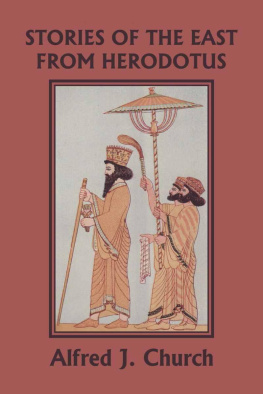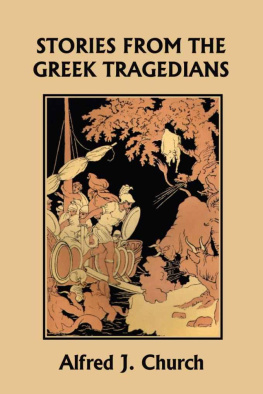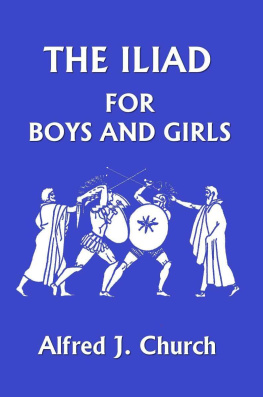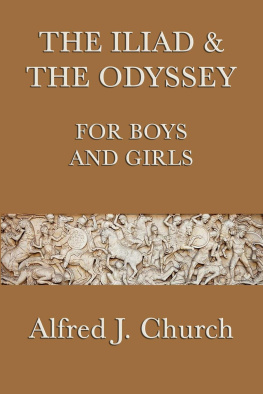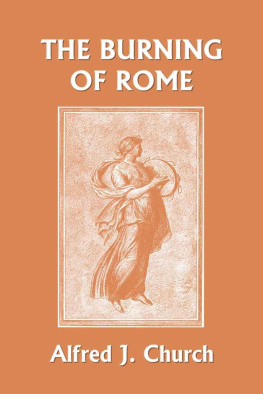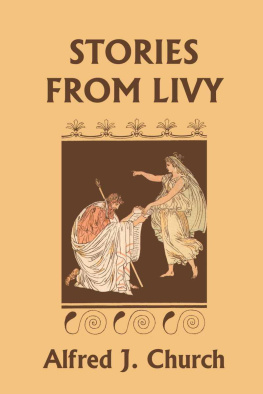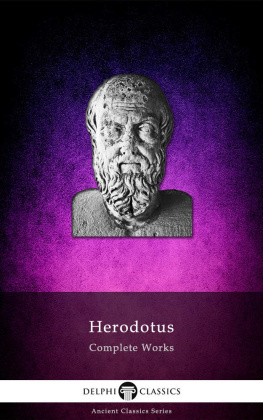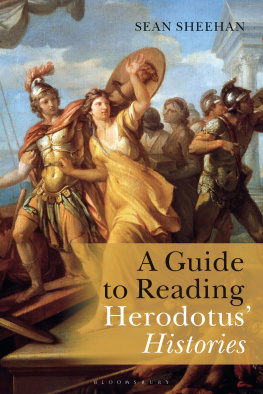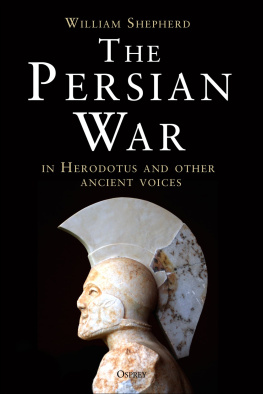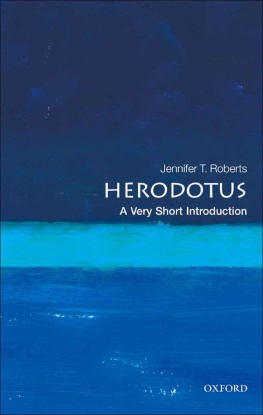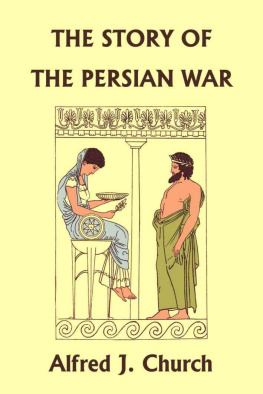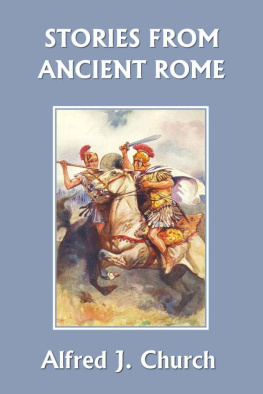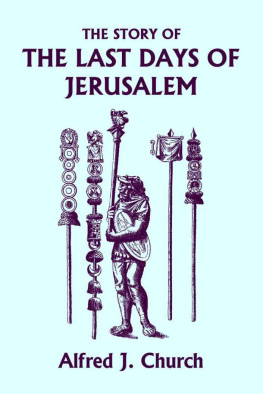Alfred J. Church - Stories of the East From Herodotus, Illustrated Edition
Here you can read online Alfred J. Church - Stories of the East From Herodotus, Illustrated Edition full text of the book (entire story) in english for free. Download pdf and epub, get meaning, cover and reviews about this ebook. year: 2009, publisher: Yesterdays Classics, genre: Science. Description of the work, (preface) as well as reviews are available. Best literature library LitArk.com created for fans of good reading and offers a wide selection of genres:
Romance novel
Science fiction
Adventure
Detective
Science
History
Home and family
Prose
Art
Politics
Computer
Non-fiction
Religion
Business
Children
Humor
Choose a favorite category and find really read worthwhile books. Enjoy immersion in the world of imagination, feel the emotions of the characters or learn something new for yourself, make an fascinating discovery.
- Book:Stories of the East From Herodotus, Illustrated Edition
- Author:
- Publisher:Yesterdays Classics
- Genre:
- Year:2009
- Rating:4 / 5
- Favourites:Add to favourites
- Your mark:
- 80
- 1
- 2
- 3
- 4
- 5
Stories of the East From Herodotus, Illustrated Edition: summary, description and annotation
We offer to read an annotation, description, summary or preface (depends on what the author of the book "Stories of the East From Herodotus, Illustrated Edition" wrote himself). If you haven't found the necessary information about the book — write in the comments, we will try to find it.
Alfred J. Church: author's other books
Who wrote Stories of the East From Herodotus, Illustrated Edition? Find out the surname, the name of the author of the book and a list of all author's works by series.
Stories of the East From Herodotus, Illustrated Edition — read online for free the complete book (whole text) full work
Below is the text of the book, divided by pages. System saving the place of the last page read, allows you to conveniently read the book "Stories of the East From Herodotus, Illustrated Edition" online for free, without having to search again every time where you left off. Put a bookmark, and you can go to the page where you finished reading at any time.
Font size:
Interval:
Bookmark:
All rights reserved. No part of this book may be reproduced or retransmitted in any form or by any means without the written permission of the publisher.
This edition, first published in 2010 by Yesterday's Classics, an imprint of Yesterday's Classics, LLC, is an unabridged republication of the work originally published by Scribner and Welford in 1881. This title is available in a print edition (ISBN 978-1-59915-386-5).
Yesterday's Classics republishes classic books for children from the golden age of children's literature, the era from 1880 to 1920. Many of our titles are offered in high-quality paperback editions, with text cast in modern easy-to-read type for today's readers. The illustrations from the original volumes are included except in those few cases where the quality of the original images is too low to make their reproduction feasible. Unless specified otherwise, color illustrations in the original volumes are rendered in black and white in our print editions.
In these stories I have kept as close to my original as I could, but I do not profess to have translated it. Of course, nothing like criticism or correction has been attempted.
I should be sorry that readers who are not acquainted with the work of the "Father of History" should carry away from this book the impression that he is nothing more than a credulous and gossiping teller of stories. That he was often deceived, and that he writes with a simplicity which is quite remote from our ways of thinking, is manifest; but those who know him best are aware that he was nevertheless a shrewd and painstaking observer, whose credit has been distinctly increased by the discoveries of modern times.
I wish to express my sincere gratitude to my relative, Miss E. L. Seeley, for the pains which she has bestowed on the illustrations to this volume.
Hadley Green, September 30, 1880
C RSUS, the son of Alyattes, began to reign over Lydia, being thirty and five years old. This Crsus made war upon all the Greeks that dwelt in the western parts of Asia, seeking some occasion of quarrel with every city. And if he could find some great matter, he used it gladly; but if not, a little thing would serve his turn. Now, the first of all the cities which he fought against was Ephesus; and when the Ephesians were besieged by him they offered their city as an offering to the goddess Artemis, fastening a rope to the wall from her temple. (The space between the temple and the wall was seven furlongs.) All the cities of the Greeks that are on the mainland did Crsus subdue, so that they paid tribute to him. And when he had ended this business, he purposed in his heart to build ships, and to make war on the Greeks that dwelt in the islands. But when all things were now ready for the building of the ships, there came to Sardis a certain Greek, a man renowned for wisdom. Some say that this Greek was Bias, the wise man of Priene, and some that he was Pittacus of Mitylene. This Greek caused Crsus to cease from his shipbuilding, for when the King would know whether he had any news from Greece, he said to him, "O King, the islanders are buying ten thousand horses, that they may set riders upon them, and so march against thee and thy city of Sardis." When Crsus heard this he was glad, hoping that the man spake truth, and said, "Now may the Gods put this into the hearts of the islanders, that they should make war with horses against the sons of the Lydians." Then the Greek answered and said, "O King, I see that thou prayest with all thy heart that thou mayest find the islanders coming against thee here on the mainland with horses, and verily thou doest well. What then dost thou think that the islanders pray for now that they know thee to be building ships? Surely that they may find the Lydians coming against them on the sea, that so they may take vengeance on thee for their brethren on the mainland, whom thou hast brought into slavery." This saying pleased King Crsus mightily; and because the Greek seemed to him to speak truly, he ceased straightway from his shipbuilding, and made alliance with the Greeks that dwelt in the islands.
Now after certain years, when all Asia that lieth to the westward of the river Halys had been subdued by Crsus (only Lydia and Cilicia were not subdued), and his kingdom flourished with great wealth and honour, there came to Sardis all the wise men of the Greeks, as many as there were in those days. But the greatest of all that came was Solon of Athens. This Solon had made laws for the Athenians, for they would have him make them, and afterwards he dwelt abroad for ten years. And he said that he did this that he might see foreign countries; but in truth he departed that he might not be compelled to change any of the laws that he had made. For the Athenians themselves could not change any, having bound themselves with great oaths to Solon, that they would live for the space of ten years under the laws which he had made for them.
Solon therefore came to Sardis, and Crsus entertained him in his palace. And on the third or fourth day after his coming the King commanded his servants that they should show Solon all the royal treasures. So the servants showed him all the things that the King possessed, a very great store of riches. And when he had seen everything and considered it, and a fitting time was come, the King said to him, "Man of Athens, I have heard much of thee in time past, of thy wisdom and of thy journeyings to and fro, for they say that thou wanderest over many lands, seeking for knowledge. I have therefore a desire to ask of thee one question: 'Whom thinkest thou to be the happiest of all the men that thou hast seen?' " And this he said hoping that Solon would answer, "Thou, O King, art the happiest man that I have seen." But Solon flattered him not a whit, but spake the truth, saying, "O King, the happiest man that I have seen was Tellus the Athenian." Then Crsus, marvelling much at these words, said, "And why thinkest thou that Tellus the Athenian was the happiest of men?" Then Solon answered, "Tellus saw his country in great prosperity, and he had children born to him that were fair and noble, and to each of these also he saw children born, of whom there died not one. Thus did all things prosper with him in life, as we count prosperity, and the end of his days also was great and glorious; for when the Athenians fought with certain neighbours of theirs in Eleusis, he came to the help of his countrymen against their enemies, and put these to flight, and so died with great honour; and the whole people of the Athenians buried him in the same place wherein he fell, and honoured him greatly."
But when Solon had ended speaking to the King of Tellus, how happy he was, the King asked him again, "Whom, then, hast thou seen that was next in happiness to this Tellus?" For he thought to himself, "Surely now he will give me the second place." Then Solon said, "I judge Cleobis and Biton to have been second in happiness to Tellus."
Cleobis and Biton were youths of the city of Argos. They had a livelihood such as sufficed them; and their strength was greater than that of other men. For not only did they win prizes of strength, but also they did this thing that shall now be told. The men of Argos held a feast to Her, who hath a great and famous temple in their city; and it must needs be that the mother of the two young men, being priestess of Her, should be drawn in a waggon from the city to the temple; but the oxen that should have drawn the waggon were not yet come from the fields. Then, as the time pressed and the matter was urgent, the young men harnessed themselves to the waggon and dragged it, and their mother the priestess sat upon it. And the space for which they dragged it was forty and five furlongs; and so they came to the temple. And when they had done this in the eyes of all the assembly, there befell them such a death that nothing could be more to be desired; the Gods, indeed, making it manifest that it is far better for a man to die than to live. For indeed the thing fell out thus. When all the people of Argos came about the woman and her sons, and the men praised the youths for their great strength, and the women praised the mother that she had borne such noble sons, the mother in the joy of her heart stood before the image and prayed that the goddess would give to her sons, even Cleobis and Biton, that which the Gods judge it best for a man to have. And when the priestess had so prayed, and the young men had offered sacrifice, and made merry with their companions, they lay down to sleep in the temple, and woke not again, but so ended their days. And the men of Argos commanded the artificers that they should make statues of the young men, and these they offered to the god at Delphi.
Font size:
Interval:
Bookmark:
Similar books «Stories of the East From Herodotus, Illustrated Edition»
Look at similar books to Stories of the East From Herodotus, Illustrated Edition. We have selected literature similar in name and meaning in the hope of providing readers with more options to find new, interesting, not yet read works.
Discussion, reviews of the book Stories of the East From Herodotus, Illustrated Edition and just readers' own opinions. Leave your comments, write what you think about the work, its meaning or the main characters. Specify what exactly you liked and what you didn't like, and why you think so.

